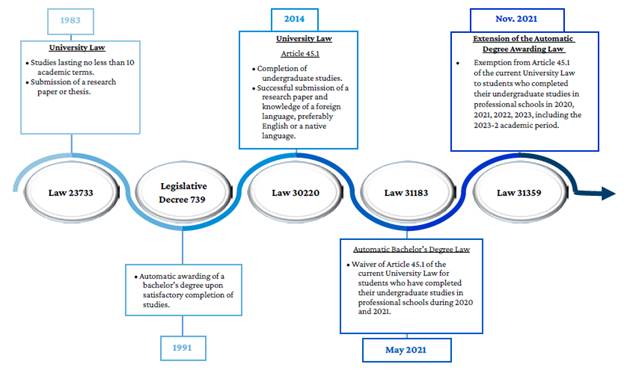Dear Editor:
The health emergency resulting from the current COVID-19 pandemic forced the governments of most countries to implement measures to restrict human mobility in order to control the spread of the virus causing this disease (SARS-CoV-2), including the suspension of on-campus activities in all educational institutions.
In Peru, specifically in the context of higher education, the Ministry of Education, through the Vice-Ministerial Resolution 081-2020-MINEDU of 2020,1 ordered the suspension of classes and classroom activities in public and private universities due to the high risk of contagion and rapid transmission of SARS-CoV-2. Consequently, the predominant educational modality during the pandemic was e-learning, in which theoretical and practical classes were taught online, especially in public universities across the country.2
These two measures were used as justification by the Congress of the Republic to enact Law 31183 (also known as Automatic Degree Awarding Law) in May 2021,3 which waives all the requirements for obtaining a bachelor's degree (approval of a research paper and a level of knowledge in a foreign language) contemplated in Law 30220 of 20144 for university students who completed their undergraduate studies in professional schools in 2020 and 2021, and Law 31359 in November 2021,5 which extends the term for obtaining a degree under said modality (Figure 1, which is based on laws 31181,3 30220,4 31359,5 and 23733,6 and Legislative Decree 379.7).

Source: Elaboration based on laws 311813, 302204, 31359,5 and 23733,6 and Legislative Decree 379.7
Figure 1 Changes in the legal framework that governs the awarding of a bachelor's degree in Peru over time.
These waivers could affect the development of scientific research by undergraduate medical students. Among other reasons, this is due to the fact that scientific research (together with academia and social projection) is considered part of the triad of comprehensive university education.8 For medical programs, scientific research is at the core of medical education, as it allows future physicians to use the knowledge they have acquired to conduct research and develop intellectual skills such as critical thinking and problem solving. In addition, it promotes self-initiative, appropriate ethical conduct, and the development of the communication skills required for the preparation of scientific articles.9 Likewise, the more prolonged and intensive the supervision of student research, such as the completion of a thesis for obtaining a professional medical degree, the greater the positive impact this activity will have on students in undergraduate medical programs.9
Therefore, the automatic bachelor's degree modality, motivated by social health reasons, adds to the shortcomings in research teaching across Latin American medical schools and faculties, which include unqualified or underqualified research advisors, research courses that fail to develop adequate research skills in students, lack of information on inappropriate research practices such as plagiarism, and limited administrative and financial support.10-12In other words, along with these problems, the automatic bachelor's degree awarding law drives further away undergraduate medical students from research, given that this is the stage of training in which the greatest number of Peruvian medical researchers have declared that they have started biomedical research.13
In this regard, studies conducted before the introduction of Law 302204 showed a low intention of obtaining a degree through the completion of a research thesis (4.60-11.00%) among medical interns.13,14In turn, in a study conducted with data from 1 241 medical students from the 8 medical schools in Lima, Peru, who studied their final year in 2016, Urrunaga-Pastor et al.15 found that the average number of scientific publications was higher in students from schools that had the completion of a thesis as a mandatory requirement for graduating as physicians.
Consequently, we deem it necessary to reconsider the automatic bachelor's degree awarding law, since it is clear that it indirectly threatens the promotion and development of scientific research in undergraduate medical students. Moreover, its extension for two more years (until 2023) has no explanation whatsoever, even more so when on-campus activities were resumed in 2022.16 Even though the COVID-19 pandemic is a fact of life that we must all accept and with which learn we must to live in the context of a new normal reality, scientific research in undergraduate programs, and more so in medical programs, must always be promoted.















